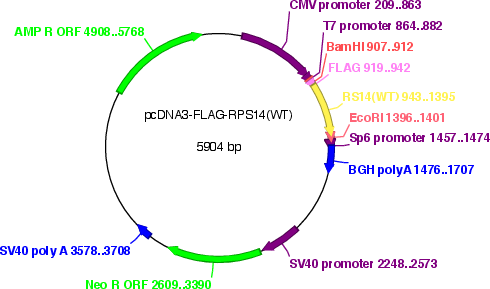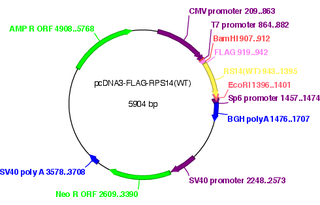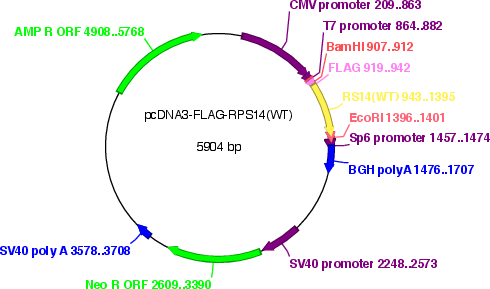pcDNA3-FLAG-RPS14(WT)
(Plasmid
#122297)
-
Purposeexpresses RPS14 protein with a flag tag
-
Depositing Lab
-
Sequence Information
Ordering
| Item | Catalog # | Description | Quantity | Price (USD) | |
|---|---|---|---|---|---|
| Plasmid | 122297 | Standard format: Plasmid sent in bacteria as agar stab | 1 | $85 | |
Backbone
-
Vector backbonepcDNA3
- Backbone size w/o insert (bp) 5450
- Total vector size (bp) 5900
-
Vector typeMammalian Expression
-
Selectable markersNeomycin (select with G418)
Growth in Bacteria
-
Bacterial Resistance(s)Ampicillin, 100 μg/mL
-
Growth Temperature37°C
-
Growth Strain(s)DH5alpha
-
Copy numberHigh Copy
Gene/Insert
-
Gene/Insert nameRPS14
-
Alt nameuS11
-
SpeciesH. sapiens (human)
-
GenBank IDNM_005617
-
Entrez GeneRPS14 (a.k.a. EMTB, S14, uS11)
- Promoter CMV
-
Tag
/ Fusion Protein
- Flag (N terminal on insert)
Cloning Information
- Cloning method Restriction Enzyme
- 5′ cloning site BamHI (not destroyed)
- 3′ cloning site EcoRI (not destroyed)
- 5′ sequencing primer T7: TAATACGACTCACTATAGGG
- 3′ sequencing primer SP6: ATTTAGGTGACACTATAG (Common Sequencing Primers)
Terms and Licenses
-
Academic/Nonprofit Terms
-
Industry Terms
- Not Available to Industry
Trademarks:
- Zeocin® is an InvivoGen trademark.
These plasmids were created by your colleagues. Please acknowledge the Principal Investigator, cite the article in which the plasmids were described, and include Addgene in the Materials and Methods of your future publications.
-
For your Materials & Methods section:
pcDNA3-FLAG-RPS14(WT) was a gift from Gerardo Ferbeyre (Addgene plasmid # 122297 ; http://n2t.net/addgene:122297 ; RRID:Addgene_122297) -
For your References section:
Senescence-associated ribosome biogenesis defects contributes to cell cycle arrest through the Rb pathway. Lessard F, Igelmann S, Trahan C, Huot G, Saint-Germain E, Mignacca L, Del Toro N, Lopes-Paciencia S, Le Calve B, Montero M, Deschenes-Simard X, Bury M, Moiseeva O, Rowell MC, Zorca CE, Zenklusen D, Brakier-Gingras L, Bourdeau V, Oeffinger M, Ferbeyre G. Nat Cell Biol. 2018 Jul;20(7):789-799. doi: 10.1038/s41556-018-0127-y. Epub 2018 Jun 25. 10.1038/s41556-018-0127-y PubMed 29941930





